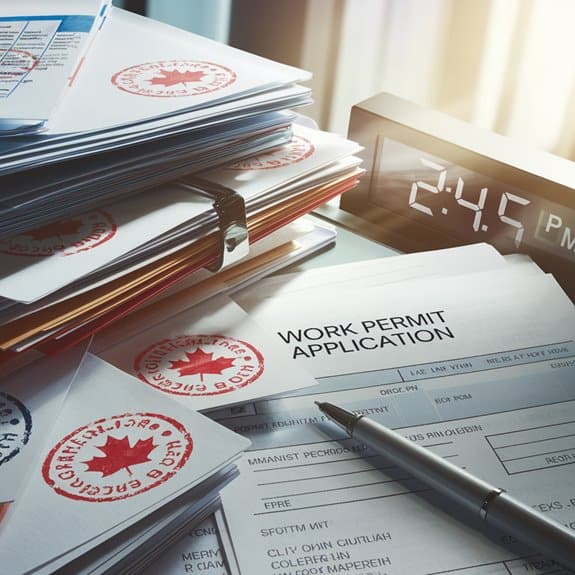
You’ll need a Labour Market Impact Assessment (LMIA) work permit to work legally in Canada. Your employer must prove no qualified Canadians are available for the position by conducting recruitment efforts and meeting wage requirements. The process involves detailed documentation, including proof of qualifications and proper advertising. Both skilled (TEER 0-3) and semi-skilled (TEER 4-5) positions are eligible, with different requirements for each. Understanding the specific requirements will strengthen your application’s success.
Understanding the LMIA Application Process
Before you can hire a foreign worker in Canada, you’ll need to navigate the Labor Market Impact Assessment (LMIA) application process, which serves as an essential first step in obtaining a work permit.
As an employer, you’ll need to demonstrate that you’ve made genuine efforts to hire Canadian workers through advertising and recruitment. You must prove there’s a legitimate labour shortage and that bringing in a foreign worker won’t negatively impact Canada’s job market.
The application requires detailed documentation, including your recruitment efforts, job posting details, and proof that you’ll offer wages meeting or exceeding the prevailing rate for the position.
Once you receive a positive LMIA, you can proceed with the work permit application through Immigration, Refugees and Citizenship Canada (IRCC).
Key Requirements for Employers Seeking LMIA
When applying for a Labor Market Impact Assessment (LMIA), employers must meet several critical requirements to demonstrate their eligibility and compliance with Canadian labour standards.
You’ll need to prove you’ve conducted genuine recruitment efforts to hire Canadians first, including advertising the position for at least four weeks.
You must offer wages that match or exceed the prevailing rate for the occupation and provide working conditions that meet provincial standards.
If you’re hiring for a low-wage position, you’ll have to cover transportation costs and guarantee affordable housing is available.
Additionally, you’ll need to submit a change plan for high-wage positions, showing how you’ll reduce reliance on temporary foreign workers.
You must also verify your business’s legitimacy and maintain detailed records of your recruitment process.
Skilled vs. Semi-Skilled Work Permit Categories
Understanding the distinction between skilled and semi-skilled work permits in Canada is essential for foreign workers seeking employment opportunities. You’ll find that skilled permits are designed for TEER 0-3 positions requiring specialized knowledge, while semi-skilled permits cover TEER 4-5 roles with less formal education requirements.
| Category | Skilled Permits | Semi-Skilled Permits |
|---|---|---|
| Education | University/college degree required | High school or job training |
| Benefits | Path to PR, spouse work permit | Industry-specific opportunities |
| Requirements | Language proficiency needed | Less stringent qualifications |
Each permit type offers distinct advantages. Skilled permits provide clearer pathways to permanent residency and family benefits, while semi-skilled permits offer valuable entry points into high-demand sectors with opportunities for skill development and career growth.
Benefits and Advantages of LMIA Work Permits
LMIA-based work permits offer foreign workers a robust set of advantages in Canada’s employment landscape.
You’ll gain access to Canada’s labour market with legal protections and fair wages, while your spouse or common-law partner can apply for an open work permit. Your dependent children will also have educational opportunities in Canada.
If you’re in a skilled occupation, you’ll benefit from potential pathways to permanent residency through the Canadian Experience Class and earn additional points in the Express Entry system.
Even in semi-skilled positions, you’ll find opportunities for career growth and skill development.
You’ll also receive employer support, including health insurance coverage and, for low-wage positions, assistance with transportation and housing.
These benefits make LMIA work permits an attractive option for building your career in Canada.
Documentation and Supporting Evidence
Securing an LMIA-based work permit requires you to submit a thorough package of supporting documents that prove your eligibility and qualifications.
You’ll need to include your valid passport, the positive LMIA letter, and a signed job offer from your employer that matches the LMIA details.
Your application must contain proof of your educational credentials, relevant work experience certificates, and professional qualifications that align with the job requirements.
If you’re applying from a visa-required country, you’ll also need to demonstrate strong ties to your home country and your intention to return after your work permit expires.
Additionally, you’ll need to provide evidence of sufficient funds to support yourself, a clean police clearance certificate, and proof of language proficiency for skilled positions.
Common Reasons for Application Refusals
While applying for an LMIA-based work permit requires extensive documentation, there are several common pitfalls that can lead to application refusals.
You’ll need to be particularly mindful of proving your intent to return to your home country, especially if you’re from a visa-required nation. Additionally, insufficient proof of qualifications or incomplete documentation can quickly derail your application process.
Here are the most frequent reasons for work permit refusals:
- Failure to demonstrate sufficient ties to your home country and clear intent to return
- Inadequate proof of meeting job qualifications, including education and work experience
- Missing or incomplete documentation, such as expired police certificates or missing language test results
Understanding these common reasons for refusal can help you prepare a stronger application and increase your chances of success.
Recent Changes to LMIA Regulations
Throughout 2024, Canada’s LMIA regulations are undergoing significant changes that’ll affect both employers and foreign workers.
Starting November 8, you’ll see a 20% increase in the wage threshold that determines high-wage versus low-wage streams. From October 28, employers can’t use attestations from lawyers and accountants to verify business legitimacy.
For low-wage positions, new restrictions take effect September 26.
If you’re in a metropolitan area with 6% or higher unemployment, your LMIA applications won’t be processed. The cap on low-wage positions drops to 10% in most sectors, while construction and healthcare see a 20% cap.
Additionally, the maximum employment duration for low-wage positions was reduced from two years to one year.
Provincial Wage Thresholds and Requirements
As you navigate Canada’s LMIA-based work permits, you’ll need to understand the specific wage thresholds for each province and territory, which range from $24.04 in New Brunswick to $39.24 in the Northwest Territories as of April 2024.
These thresholds determine whether you’ll fall into the high-wage or low-wage category, which directly impacts your application requirements and employer obligations.
Starting November 2024, the wage threshold will increase by 20% across all regions, affecting how positions are classified.
- High-wage employers must submit detailed progression plans showing steps to reduce reliance on foreign workers.
- Low-wage positions face stricter caps and duration limits, especially in areas with 6%+ unemployment.
- Employers must meet specific requirements for transportation, housing, and healthcare coverage based on wage classification.
Navigating Post-LMIA Challenges
Obtaining a positive LMIA marks an important milestone in your journey to work in Canada, but it’s just the first step in securing your work permit.
You’ll need to demonstrate that you meet all job criteria and can prove your intent to return to your home country after your permit expires.
If you’re from a visa-required country, you’ll face additional challenges, including higher refusal rates and more stringent documentation requirements.
Common reasons for work permit refusals include insufficient proof of qualification, incomplete documentation, and lack of evidence showing ties to your home country.
To improve your chances of approval, verify you’ve gathered all required documents, can prove your qualifications match the job requirements, and can demonstrate sufficient funds for your stay in Canada.
How Canadian Currents Immigration Can Help
When maneuvering the complexities of LMIA-based work permits, Canadian Currents Immigration’s experienced team of lawyers, consultants, and paralegals can provide invaluable guidance.
With decades of combined experience in immigration law, we’ll work closely with you to develop a tailored strategy that addresses your specific immigration needs and maximizes your chances of success.
Our team can assist you with:
- Preparing and reviewing LMIA applications to guarantee compliance with employment standards and labour market requirements
- Steering the work permit application process, including documentation gathering and submission
- Addressing potential challenges unique to your situation, whether you’re applying as a skilled or semi-skilled worker
We’re committed to delivering efficient, cost-effective legal services while maintaining clear communication throughout your immigration journey.
Frequently Asked Questions
Can Temporary Foreign Workers Switch Jobs Within the Same Company?
You’ll need a new LMIA and work permit to switch positions within your company, even if it’s internal. Your current work permit is specific to your original job and employer.
What Happens if a Foreign Worker Becomes Ill During Employment?
If you become ill during employment, you’ll have health insurance coverage, either through provincial healthcare or employer-provided private insurance, and you’re entitled to sick leave according to labor standards.
Are Lmia-Based Work Permits Renewable After Their Initial Expiry Date?
You can renew your work permit if you have a new LMIA and meet eligibility requirements. Remember to apply before your current permit expires to maintain legal work status in Canada.
Can Foreign Workers Start Online Training Before Arriving in Canada?
You can start online training before arriving in Canada, but formal work activities must wait until you’ve received your work permit and entered the country legally.
How Do Statutory Holidays and Vacation Time Apply to LMIA Workers?
You’re entitled to the same statutory holidays and vacation time as Canadian workers. You’ll get time off or holiday pay according to your province’s employment standards legislation.
Conclusion
As you pursue your Canadian work permit through the LMIA process, you’ll need to stay informed about requirements, wage thresholds, and documentation. Whether you’re applying as a skilled or semi-skilled worker, understanding the specific criteria for your category is essential. Remember that success depends on meeting provincial requirements and maintaining compliance with current regulations. Working with experienced immigration professionals can help streamline your LMIA application journey.

We serve ALL of Canada. Currently have offices Western Canada — Vancouver, Calgary, Edmonton, Kamloops and Red Deer. We also have the infrastructure to work with any of our clients virtually — even from the furthest regions of the Yukon to Newfoundland.
Call (778) 331-1164 [toll free 1 (844) 715-0940] to get routed to the best office for you or contact us online to schedule an appointment.
We also have a dedicated intake form to help you get the ball rolling. Our intake team will review your specific case and advise you on the next steps to take as well as what to expect moving forward.
Our offices are generally open 8:30 a.m.—4:30 p.m., Mon—Fri.

Whitney Manfro
IMMIGRATION LAWYER
Whitney takes pride in her ability to swiftly negotiate fair outcomes, yet she understands the necessity of pursuing litigation to resolve certain disputes. To this end, she has served national corporations, start-ups, senior executives, and individual employees across a broad range of industries.



